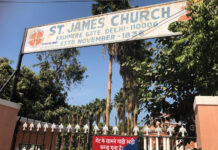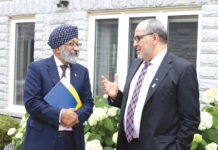News East West
CHANDIGARH: Not to be left behind the Congress, the ruling Akali Dal has joined the demand for Other Backward Class (OBC) status for Jat Sikhs of the state.
Sikhs make up over 63 percent of Punjab’s population, with the bulk of them belonging to the Jat Sikh community.
Just yesterday, on December 22, former chief minister and Congress leader Capt Amarinder Singh had written to the Prime minister, demanding that the Jats of Punjab, Jammu and Kashmir, Maharashtra and Andhra Pradesh be included in the OBC category.
“Jats have presence in 13 states of the country. While the Government of India in its last Cabinet decision approved reservation for Jats in nine states, those residing in Punjab, Jammu and Kashmir, Andhra Pradesh and Maharashtra have been left out. This is unfair and discriminatory as national decisions cannot be applied selectively. This is arbitrary and will be viewed as partisan,” Capt Amarinder Singh had said in his letter to the PM.
Capt Amarinder Singh, who is currently the president of the All-India Jat Mahasabha, also challenged the Akali leadership to provide benefits of OBC reservation to the Jat Sikhs.
Responding to it, the core committee of the Akali Dal met here on Monday under the leadership of party president and deputy chief minister Sukhbir Badal and demanded from the Central government to include Jat Sikhs in the list of Other Backward Classes. Jat Sikhs are the backbone of the Akali Dal.
Alleging that the exclusion of Jat Sikhs from the OBC list was part of the Congress’ anti-Sikh agenda, Sukhbir Badal said the Akali Dal will take up the matter with the Central government.
Chief Minister Parkash Singh Badal, who was present at the meeting as he is also member of the core committee, said the Centre should appreciate the role of the Jat Sikhs in the country’s green revolution.
Former Union minister and Rajya Sabha MP M.S Gill also joined the issue, by dashing off a letter to the Prime Minister.
Gill, who was dropped from the Union Cabinet after his unspectacular stint as a minister in July 2011, told the Prime Minister in his letter, “Last year, when an investigation was launched into the status of Jats by the Government of India, I was surprised to find that the Jat Sikhs of Punjab were not included in the probe launched in other states of the North. I wrote to you — pointing this out — but with no apparent results. Now, we find that the Cabinet has approved the inclusion of Jats in all the states, barring Sikh Jats of Punjab, in the OBC category.”
Gill, who was elected to the Rajya Sabha in 2004 after he retired as India’s chief election commissioner, said, “I write this (letter)with anguish and in hope that this clear discrimination against Punjab and its Sikh peasantry will be immediately redressed.’’
Interestingly, if the Jat Sikhs, who make up more than 25 percent of the population, are also included in the reservation list, only a very small percentage of Punjab’s population will be left out of reservation categories.
The Scheduled Castes (Sikhs and Hindus) make up almost 35 percent of Punjab’s population – the highest in India in terms of the state’s population.
Then there are other intermediary Sikh and Hindu castes that are included in the OBC list. Together, both scheduled castes and backward classes make up more than 50 percent of Punjab’s population.
Since Jat Sikhs are the biggest component of the state’s population, it is clear that if they are included in the OBC reservation category, almost between 80 and 90 percent of the state’s population will come under the reservation quota.
As per the latest census, Sikhs make up over 63 percent of Punjab’s population, Hindus about 34 percent, Muslims 2 percent, Christians (mostly Dalits) 1.2 percent and Jains 0.16 percent.








